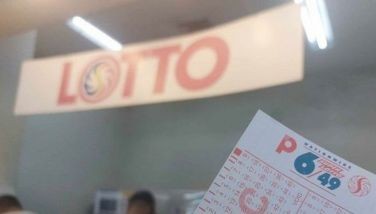$5 million grant-in-aid for former MNLF rebels
January 18, 2002 | 12:00am
The United States government has issued a grant of up to $5 million for the livelihood programs of the former rebels of the Moro National Liberation Front.
A memorandum of understanding was signed by the United States government and the Autonomous Region of Muslim Mindanao the other day in Makati City for the Livelihood Enhancement and Peace program (LEAP). The program would be funded by a grant of up to $5 million initially through the United States Agency for International Development (USAID).
USAID director Patricia Buckles said the fund would be used to finance technical assistance in developing agricultural and acquatic commodities such as corn, fertilizers and seaweed for the former combatants and their communities. Initially, the program targets up to 1,500 of the 13,000 total former MNLF rebels and 50 of the 200 MNLF communities.
One of the primary aspects of the program is to provide assistance to the beneficiaries in producing readily marketable crops suitable for the area in which they live.
For the communities, LEAP will provide post harvest equipment or small rural infrastructure, capacity building and training activities.
Depending on the success of the initial targets, Buckles said the LEAP could be expanded to cover all of the former combatants and their communities.
Buckles noted that the poverty situation in ARMM is one of the worst in the country, affecting their health, education and overall of life. She said that health indicators in the ARMM are lowest in the country with high records of tuberculosis cases, infant mortality rates and low vaccination coverage. Literacy among women is also of the lowest along with the enrollment of school children.
A memorandum of understanding was signed by the United States government and the Autonomous Region of Muslim Mindanao the other day in Makati City for the Livelihood Enhancement and Peace program (LEAP). The program would be funded by a grant of up to $5 million initially through the United States Agency for International Development (USAID).
USAID director Patricia Buckles said the fund would be used to finance technical assistance in developing agricultural and acquatic commodities such as corn, fertilizers and seaweed for the former combatants and their communities. Initially, the program targets up to 1,500 of the 13,000 total former MNLF rebels and 50 of the 200 MNLF communities.
One of the primary aspects of the program is to provide assistance to the beneficiaries in producing readily marketable crops suitable for the area in which they live.
For the communities, LEAP will provide post harvest equipment or small rural infrastructure, capacity building and training activities.
Depending on the success of the initial targets, Buckles said the LEAP could be expanded to cover all of the former combatants and their communities.
Buckles noted that the poverty situation in ARMM is one of the worst in the country, affecting their health, education and overall of life. She said that health indicators in the ARMM are lowest in the country with high records of tuberculosis cases, infant mortality rates and low vaccination coverage. Literacy among women is also of the lowest along with the enrollment of school children.
BrandSpace Articles
<
>
- Latest
- Trending
Trending
Latest
Trending
Latest
Recommended






























